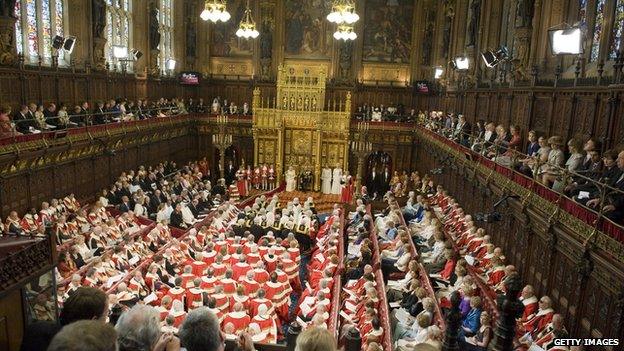Business boost in Queen's Speech
- Published

The State Opening of Parliament is one of the highlights of the Westminster calendar
The government has announced a series of measures in the Queen's Speech that it said were "unashamedly pro-work and pro-business".
Included in a raft of bills were proposals to make it easier for small businesses to access finance and remove red tape.
There will also be measures to tackle zero-hours contracts and national minimum wage abuses.
Some childcare regulations will also be made more flexible.
A corporate ownership bill will make it easier to punish rogue company directors by increasing the period for which they can be disqualified and awarding compensation to victims.
The bill will also introduce a public register of beneficial shareholders in a company.
The Small Business, Enterprise and Employment bill will put forward proposals to give small business owners fairer access to compete for £230bn worth of annual public procurement contracts.
It will also include measures to ensure larger companies pay small business owners promptly for work they do for them.
Earlier, Prime Minister David Cameron said: "Countries rise when their people rise. So this Queen's Speech is unashamedly pro-work, pro-business and pro-aspiration."
Momentum
Terry Scuoler, chief executive of EEF, the manufacturers' organisation, welcomed what he said were "a number of pro-growth and pro-work policies".
He said: "The government must now keep momentum going for the next 11 months and not stall just as the economy is beginning to motor.
"It is also essential that the legislation proposed does not load any extra burdens on to employers, or remove their ability to recruit and employ in a flexible way to suit their business."
Katja Hall, deputy director-general of the CBI, said changes to make it easier for small businesses to tender for public sector contracts were much needed.
She also said the CBI backed measures to put pressure on companies who failed to pay suppliers promptly.
"Growing businesses rely on cash flow and are too often hampered by late payers, so we back a 'comply or explain' system for payment terms of more than 60 days."
She added businesses would support a ban on exclusivity clauses in zero hours contracts, which stop employees working for more than one company despite offering no guaranteed hours of work.
Such a ban, she said, would "be a proportionate response to some of the issues that have been highlighted, as it focuses on poor practice rather than demonising flexible work in general".
- Published4 June 2014

- Published4 June 2014

- Published4 June 2014
